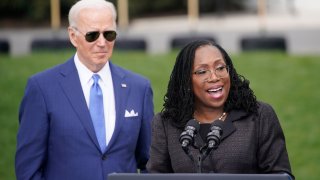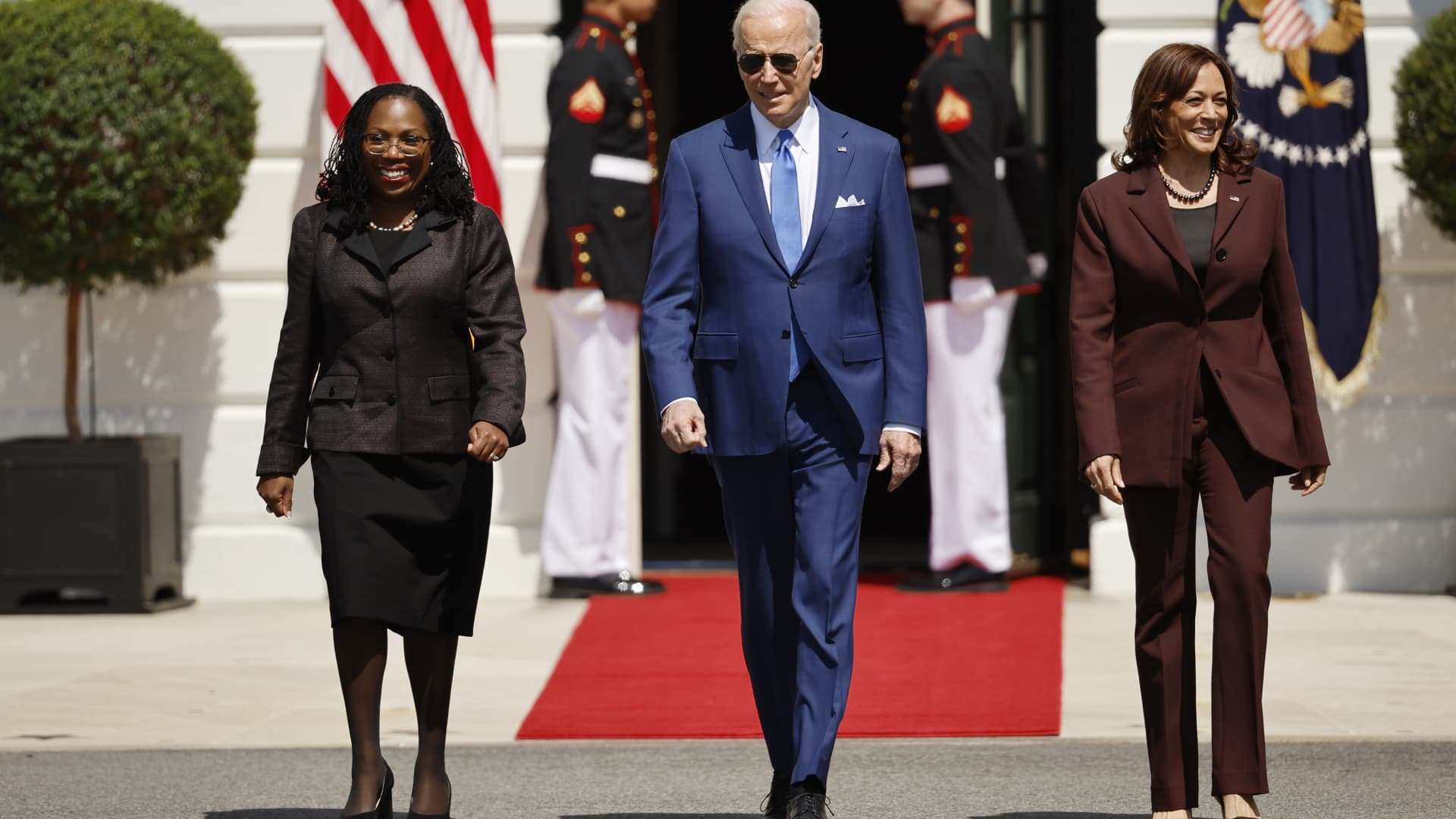
- Judge Ketanji Brown Jackson, the first Black woman confirmed to the Supreme Court, on Friday touted the historic moment as a step forward in the history of race in the United States.
- The Senate had confirmed Jackson to the high court in a 53-47 vote, with three Republicans joining all Democrats in support of her nomination.
Judge Ketanji Brown Jackson, the first Black woman confirmed to the Supreme Court, on Friday touted her rise to the top U.S. court as a step toward the country realizing its ideals.
"It has taken 232 years and 115 prior appointments for a Black woman to be selected to serve on the Supreme Court of the United States," an emotional Jackson said in a speech outside the White House.
Feeling out of the loop? We'll catch you up on the Chicago news you need to know. Sign up for the weekly Chicago Catch-Up newsletter here.
"But, we've made it. We've made it, all of us," Jackson said.
Her speech followed remarks from President Joe Biden and Vice President Kamala Harris, both of whom underscored the historic nature of Jackson's confirmation.
"This is a moment of real change," Biden said. "It's a powerful thing, when people can see themselves in others."

The president also praised Jackson for keeping her composure throughout her confirmation process.
Money Report
"There was verbal abuse, the anger, the constant interruptions, the most vile, baseless assertions and accusations," Biden said. But the judge responded with "patience and restraint, and yes, perseverance and even joy," he said, demonstrating the "incredible character and integrity she possesses."
The Senate confirmed Jackson to the high court in a 53-47 vote on Thursday. Three Republicans joined all Democrats in support of her nomination.
The 51-year-old federal judge will replace Justice Stephen Breyer, 83, when he retires at the end of the court's current term. Jackson previously clerked for Breyer, who has served as an associate justice for nearly 28 years.
Though her ascension to the bench is assured, Jackson will not become a Supreme Court associate justice until Breyer steps down later this year. Only then can she take her judicial oath and become Justice Jackson.
Once she does, Jackson will join a court that has grown substantially more conservative following the appointment of three of former President Donald Trump's nominees. Her addition will maintain the size of the court's liberal wing, which is outnumbered 6-3 by the conservative bloc.
The audience for Friday's celebration on the south lawn of the White House comprised dozens of Democratic lawmakers, including Senate Majority Leader Chuck Schumer, D-N.Y., and most of the Democrats on the Senate Judiciary Committee.
Jackson endured more than 23 hours of questioning over just two grueling days of confirmation hearings in that committee last month. Republicans on the panel slung heated accusations about Jackson's sentencing record and grilled her on her judicial philosophy, while Democrats sought to defend the judge and sing her praises.
"You've heard a lot from me and about me," Jackson said Friday.
She expressed gratitude in that speech, first to God and then to the many people who helped carry her nomination across the finish line. She touched on the marathon confirmation process, noting that she met with 97 senators in 95 personal meetings.
"It's been somewhat overwhelming, in a good way, to recently be flooded with thousands of notes and cards and photos expressing just how much this moment means to so many people," she said.
Being a role model, particularly to younger Americans, is a "huge responsibility," but Jackson said she feels "up to the task" because she is buoyed by her own role models. She named civil rights icon Dr. Martin Luther King Jr. and Thurgood Marshall, the first Black Supreme Court justice, as well as Constance Baker Motley, who in 1966 became first Black woman to serve as a federal judge.
"For all of the talk of this historic nomination, and now confirmation, I think of them as the true path breakers. I am just the very lucky first inheritor of the dream of liberty and justice for all," Jackson said.
She then quoted the poet Maya Angelou: "I do so now by bringing the gifts my ancestors gave. I, I am the dream and the hope of the slave."
This is breaking news. Please check back for updates.






